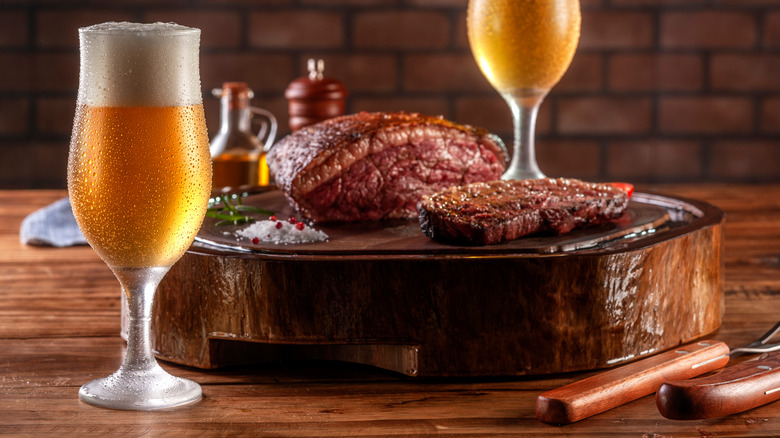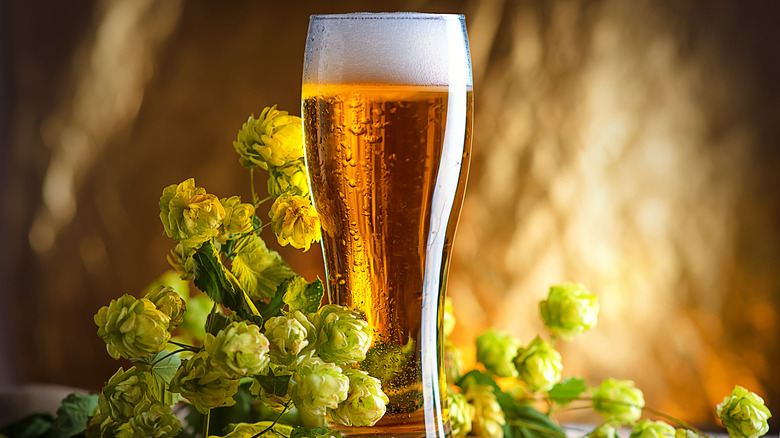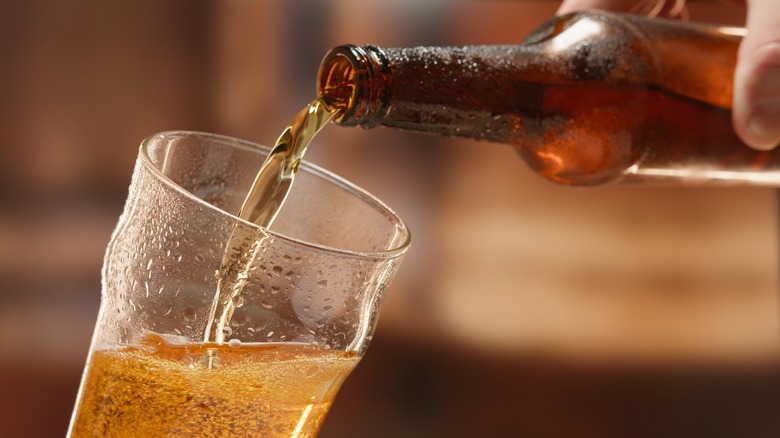Steer Clear Of This Temperature Mistake When Cooking With Beer
When it comes to cooking with alcohol, most cooks think of using wine or spirits like brandy, but beer is a common ingredient as well. History states that the first beers were likely brewed using barley, and originated in the Middle East around 5,000 years ago. This fermented drink was so valued by the Sumerians that they had a goddess devoted to beer production. NPR adds that food made with beer was prescribed by ancient Egyptian and Sumerian physicians as well.
BBC reports that cooking with beer (whether or not it's really good for you) can be a great way to impart complex flavors to a recipe. It can be as simple as infusing a dessert with a robust chocolate stout, or as complex as roasting fish with a fruity sour beer. The world of beer is bursting with bold flavors and aromas that can help add a ton of character to any recipe. Just like pairing food and beer for a meal, there are a lot of things to consider when cooking with beer. If this is your first time cooking with beer though, there are a few things to keep in mind.
Keep hoppy beers at a low temperature
According to NPR, when selecting the beer you're going to add to your recipe, you need to consider the characteristics of the beer. Are you trying to add notes of roasted malt, or maybe something brighter and zestier instead? Don't just reach for your favorite beer and assume that it's the best option, though — especially if it's an IPA. The endless number of IPAs available in the beer aisle might make it tempting to add one to your latest recipe but do so with caution. There are plenty of IPAs that have strong notes of citrus fruit, but they often still have a lot of bitterness as well, per NPR.
Michelin Guide adds that these bitter notes can be exaggerated if treated incorrectly. When hoppy beers like IPAs are heated above 180 degrees F, the hops will turn even more bitter and likely mask any of those other notes you're hoping to draw out. To solve this, stick to cooking methods that capitalize on low-and-slow cooking methods or highly controlled methods like sous vide cooking. This will prevent your stew, soup, or beer-brined meat from turning bitter and unappetizing.
Is it safe to cook with beer?
Cooking with beer and alcohol can come with some safety concerns. Michelin Guide points out that igniting a spirit for a showy flambé can be a lot of fun but does take some safety considerations. Parents might also have some concerns with serving foods that contain alcohol to children.
Idaho State University (ISU) claims that while it's generally believed that cooking will remove most of the alcohol present in a dish, that isn't always the case. Different dishes were found to retain between 4-95% of the alcohol added to them. This means a variety of different circumstances can determine just how sober you'll be after enjoying a beer-braised dish.
According to ISU, alcohol evaporates at 173 degrees F, and dishes need to spend more than two hours at this temperature to cook off more than 90% of the alcohol. That means if you still decide to use that hoppy beer in your recipe, you need to watch your temperature really carefully to keep it from going bitter. The alternative is just to accept that your dinner might also give you a buzz. Just make sure you have a designated driver.


